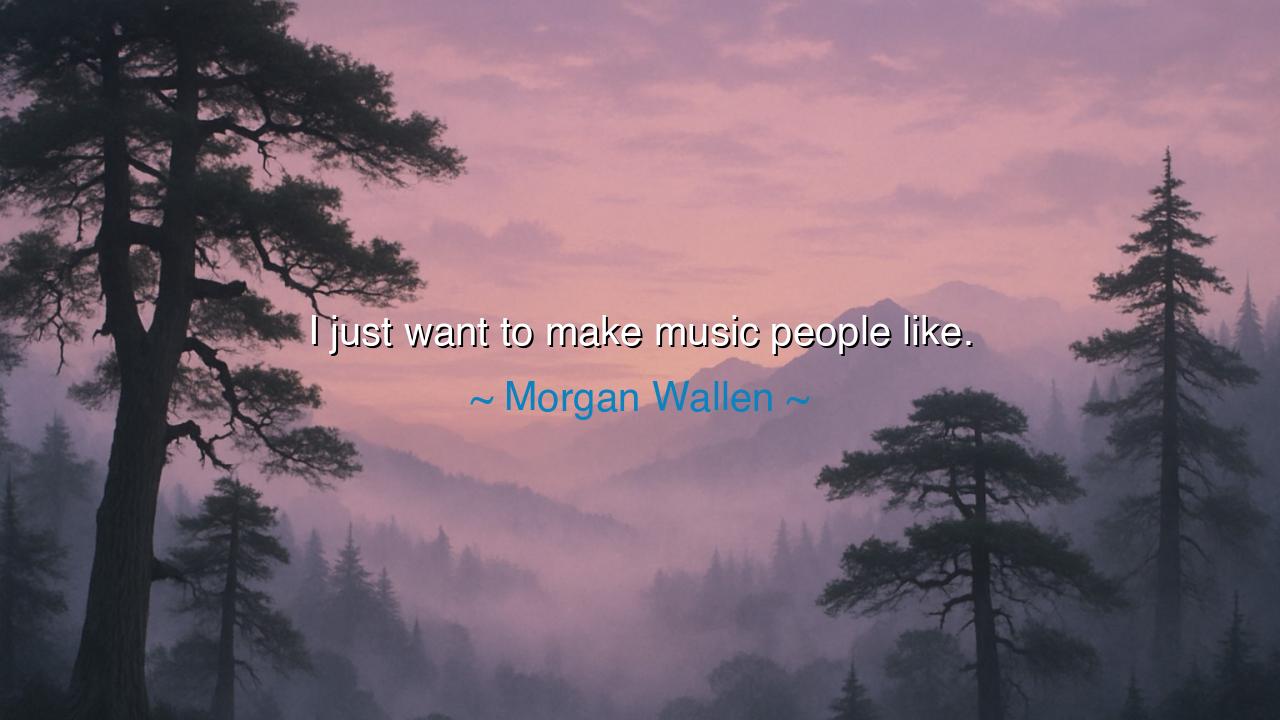
I just want to make music people like.






The words “I just want to make music people like”, spoken by Morgan Wallen, carry the weight of a humble truth: that the artist’s purpose is not self-glory, but connection. In the ancients’ way, such a phrase might be likened to a craftsman saying, “I wish to carve wood that warms the hearths of many homes.” Music, like fire, is not meant to be hoarded, but to illuminate the hearts of others. It is a recognition that greatness lies not in the echo of one’s own voice, but in the harmony it stirs within the souls who hear it.
In these words, there is no arrogance, no towering claim of conquest. Instead, there is the simplicity of service, as the farmer serves by planting grain, or the mason by raising walls that shelter lives. The true artist does not labor for monuments of stone, but for fleeting notes that dissolve in air, yet remain forever in memory. Wallen’s quote reminds us that the highest calling of music is not complexity, nor fame, but the quiet, enduring bond between the one who sings and the one who listens.
The ancients often taught that beauty is born not for the self alone, but for the many. Recall the tale of the Greek poet Sappho, whose verses did not seek empire but instead whispered tenderness across the centuries. Though she lived in obscurity compared to generals and kings, her words are remembered, while the triumphs of conquerors have turned to dust. Why? Because she touched the human heart. Wallen’s sentiment echoes this truth: to create what others can love is to carve eternity in the fragile clay of time.
Consider also the story of the wandering minstrel in medieval Europe, who journeyed from town to town with nothing but a lute and a voice. He sought no kingdom, no wealth, only the joy of seeing a weary peasant smile or a noble lady weep at a ballad. His legacy was not written in ledgers, but in the souls of those who found solace in his songs. Likewise, Wallen’s words remind us that music’s power is democratic, belonging equally to the rich and poor, to the stranger and the friend.
Yet within this humility lies strength. To seek to please others is not to diminish the self, but to enlarge it. A warrior may seek honor for himself alone, but the true hero fights for his people. In the same way, the true musician plays not to hear his own echo, but to awaken the voice of many hearts singing together. There is no greater victory than to be remembered in the laughter, the tears, and the quiet silences of those touched by one’s art.
The lesson is clear: in our own lives, whatever craft or labor we take up, let it be done for the good of others. To build a bridge, to write a line, to paint a canvas, or to speak a kind word—let it be aimed at bringing joy, hope, or comfort to another soul. The desire for personal glory may fade, but the impact of shared kindness endures. As the ancients would say, “He who gives light to others is himself never in darkness.”
Thus, let us act. When you next take up your work—whether it be in song, in word, in trade, or in daily duties—pause and ask: “Will this bring good to another?” If the answer is yes, proceed with strength and with faith. If not, consider reshaping your labor so it uplifts beyond yourself. This is how ordinary hands weave extraordinary legacies.
In the end, Morgan Wallen’s simple declaration becomes a profound teaching: to make something people like is to serve humanity with the gifts you have been given. Strive, then, to use your gifts not as treasures to guard, but as rivers that flow outward, nourishing all who drink. For in the joy of others, your own joy shall be multiplied, and your name—like the melody of a timeless song—will echo long after silence has claimed the world.






AAdministratorAdministrator
Welcome, honored guests. Please leave a comment, we will respond soon